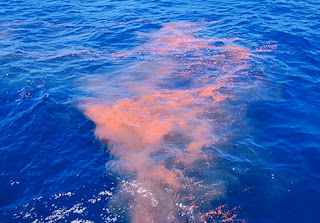I apologize if my teaser about the whale shit last Saturday left you on the edge of your seat. You should really be centered on the seat. Moving on:
So the first thing I visualized with regard to whale effluent was floaters. Really big floaters, massive seagoing turds. That image led me directly into a rewriting of the story of the Titanic, replacing the sickening, grinding thud of the iceberg with a gentle splurrrggghh, a minor slowdown through a cloven wad, and a gentle greasy slide into the harbor, where people are waiting on the dock with handkerchiefs pressed delicately to their noses.
The second and more likely image comes from childhood memories of the long string trailing out of the family guppy. It’s a powerful image, blown up to whale size, but it’s a possibility. I’ve dragged some of my shit around for forty years before getting rid of it. And it might explain why whales sometimes leap all the way out of the water. Everyone has trouble snapping one off from time to time.
It turns out I was right about the floaters. Whales feed in the depths of the ocean, but their shit floats, and phytoplankton at the surface are able to scavenge nutrition from it, making it an important marker for the health of the ecosystem. From an ecologist’s point of view, whales are just a large, rubbery device for transporting nitrogen, in the form of whale shit, from the ocean depths to the surface. It’s an odd way of looking at things, but that’s perspective for you. It’s like saying Norwegian diners are a vehicle for transporting whales to the Trondheim sewer system, which is not, ecologically speaking, as useful.
But it’s even better than that. Whales do not produce massive seagoing turds, but something altogether more wonderful, from the perspective of a word lover. They produce a flocculent plume. That comes from the Latin for a feathery mass with the consistency of a tuft of wool. I thought I was happy before, but knowing that there are flocculent plumes of whale poop floating on the ocean has enriched my life. So has learning that the word “flocculus” also refers to either of two small round lobes on the lower posterior border of the cerebellum. This is also where we get the concept “asshat.”
We word lovers can take great trips without ever leaving the dictionary, and we come back with crushes and flirtations of our own. I have been trying to work the word “snarge” into a blog post for a year, without offending the sensibilities of my birding friends. Now I have finally done it, and I owe it all to the flocculent plumes that will float forever on the surface of my cerebellum.
And the fearless Titanic ship captain of my imagination can now spy a pod of whales grunting in the distance and get the word out via the musicians in the band. “Hang onto the rails,” he might advise, “we’re going to be running into a little flocculence ahead.” I’m betting this will get that crazy dame off the bow, too.




Interesting. But I;ll never be able to look at flocked wallpaper again without getting the giggles.
Bwahahaha! As usual, a smile-inducing post to start my Wednesday just right!
Excellent and informative. I've always used the phrase "Shit for brains" yet thought it was merely descriptive. Nice to finally understand that when the cognitive process occurs exclusively in the small lower lobes on the lower posterior border of the cerebellum it's an actual physiological condition. You have explained Glenn Beck, Sarah Palin, et al.
Oh dear, Kate Winslet plummeting head first into a drift of whale flocculence would have vastly improved that movie!
Apparently there is no etymological connection between "flock" (in the sense of "herd") and "flocculent." No one knows where "flock" came from; the suggestion that it's a metathesis of "folk" is desperate (even if deeply appealing.) But a poem about flocks of folk following the flocculent plumes of whales, in flowing and fulsome hexameters, is clearly dying to be written.
Avast, ye maties
A podful of flocculence
Splurt, splurt, splurt, splurt, splurt
I bet you could sell flocculence d'orca for a pretty penny at the right boutique. It's all natural, so it's quite good for your skin, see.
That brain bears a striking resemblance to a coil of intestine…I think it's pretty clear that sometimes a thought takes a wrong turn and ends up you know-where, and the opposite is probably also true, resulting in distinctly floccked-up thinking.
My dear, if you're not putting this stuff out in a book, you're missing a seriously good bet.
Just the poop, Nance, or a more nuanced selection? I've been thinking about it. Trouble is, I want to illustrate it with drawings, and somehow I haven't gotten around to that.
I now have a new saying: "Does a whale shit in the ocean"? (The one about the bear was getting way over used)
a flocculent plume…a flocculent plume…it's almost perfect, isn't it.
Gaaawd, I'm so jealous. To be flocculently plume. Or just plain plumed. Glorious.
I don't know whether to feel sad or happy that I feel smarter for having read this post.
I guess I'm going to go with happy. I'm trying to be more positive about life, and this seems like as good a place to start as any.
Oh, my!
What Elizabeth said. My very first thought.
Murrmurrs, thanks for my morning humor spot! I am now smiling as I go about my day thinking of "flocculent plumes"! Who knew! I guess we can always trust you to enlighten us on all things flocculent! As a fellow word lover, I applaud you!
Cool! I didn't know that whales pooped in magnificent plumes. And, whale barf (ambergris) has practical applications in the perfume and cosmetics industry.
I'm forwarding the link to one of my old cop buddies, it's about the poop, and I can't get into it…. :}
So: you've been at this for over two years and nary a word about frass? You might appreciate this link to which I was directed by The Poop Report:
http://www.straightdope.com/columns/read/250/is-it-true-every-type-of-animal-dropping-has-its-own-name.
And, by the way, aren't McNuggets just extruded snarge?
Excellent and informative. I've always used the phrase "Shit for brains" yet thought it was merely descriptive. Nice to finally understand that when the cognitive process occurs exclusively in the small lower lobes on the lower posterior border of the cerebellum it's an actual physiological condition. You have explained Glenn Beck, Sarah Palin, et al.
Apparently there is no etymological connection between "flock" (in the sense of "herd") and "flocculent." No one knows where "flock" came from; the suggestion that it's a metathesis of "folk" is desperate (even if deeply appealing.) But a poem about flocks of folk following the flocculent plumes of whales, in flowing and fulsome hexameters, is clearly dying to be written.